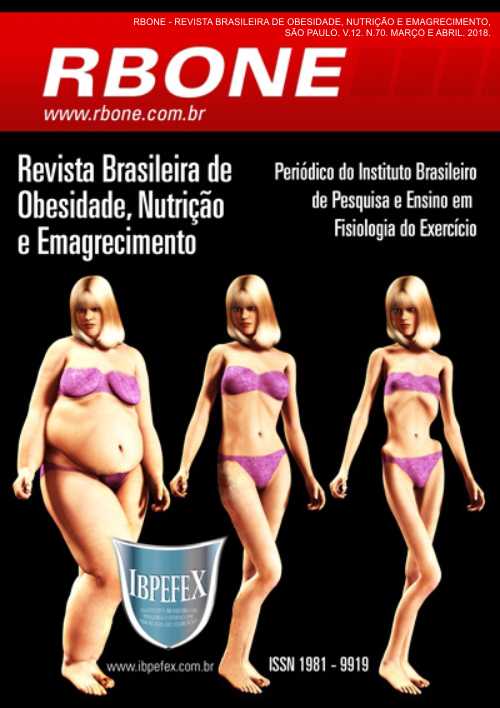Eating disorder in obese attending in a University Hospital
Abstract
The objective of this study was to investigate the symptoms of eating disorders in a non-clinical sample of obese patients attending a University Hospital of Belém-PA. It consisted of a transversal and descriptive study. There were had 51 obese participants (ages 20-76), of whom 21 male and 30 female. Participants are evaluated using the three specific scales of the Eating Disorders Inventory-3 (EDI-3). There was a greater risk for eating disorders in participants of greater weight (p ≤ 0.001) and height (p = 0.002). The diagnosis of moderate risk of eating disorder is more dominant in women and displays high risk in men (p <0.001). Obese men more presented to risk behaviors related to perceptions of their body shapes and concerns about diet and weight. It is recommended the development of a specific instrument for individuals with obesity and the performance of studies on the eating behavior of this group, including the possible risk factors involved, contributing to the advancement of care to these patients.
References
-Alvarenga, M.S.; Carvalho, P.H.B.; Philippi, S.T.; Scagliusi, F.B. Propriedades psicométricas da Escala de Atitudes Alimentares Transtornadas para adultos do sexo masculino. Jornal Brasileiro de Psiquiatra. Vol. 62. Num. 4. 2013. p. 253-260.
-Berner, L.A.; Shaw, J.A.; Witt, A.A.; Lowe, M.R. The relation of weight suppression and body mass index to symptomatology and treatment response in anorexia nervosa. J Abnorm Psychol. August. Vol. 122. Num. 3. 2013. p. 694-708.
-Bohrer, B.K.; Forbush, K.T.; Hunt, T.K. Are common measures of dietary restraint and disinhibited eating reliable and valid in obese persons? Appetite. Vol. 87. 2015. p. 344-351.
-Brasil. Ministério do Planejamento, Orçamento e Gestão. Instituto Brasileiro de Geografia e Estatística (IBGE). Pesquisa Nacional de Saúde 2013. Manual de Antropometria. Rio de Janeiro. 2013.
-Callugi, S.; Ruocco, A.; El Ghoch, M.; Andrea, C.; Geccherle, E.; Sartori, F.; Dalle Grave, R. Residential cognitive-behavioral weight-loss intervention for obesity with and without binge-eating disorder: a prospective case–control study with five-year follow-up. International Journal Eating Disorder. Vol. 49. 2016. p. 723-730.
-Carvalho, P.H.B.; Oliveira, F.C.; Neves, C.M.; Meireles, J.F.F.; Lopes, V.G.V.; Ferreira, M.E.C. Busca pela "muscularidade" e variáveis associadas em adultos jovens. Revista Brasileira de Medicina do Esporte. Vol. 22. Num. 2. 2016. p. 118-121.
-D’Emden, H.; Holden, L.; McDermott, B.; Harris, M.; Gibbons, K.; Giledhill, A.; Cotterill, A. Disturbed eating behaviours and thoughts in australian adolescents with type 1 diabetes. Journal of paediatrics and child health. Vol. 49. 2014. p. 317-323.
-Fan, Y.; Li, Y.; Liu, A.; Hu, X.; Ma, G.; Xu, G. Associations between body mass index, weight control concerns and behaviors, and eating disorder symptoms among non-clinical Chinese adolescents. BMC Public Health. Vol. 10. 2010. p. 1-12.
-Fernandez, S.; Pritchard, M. Relationships between self-esteem, media influence and drive for thinness. Eating Behaviors. Vol. 13. 2012. p. 321-325.
-Fortes, L.S.; Almeida, S.S.; Ferreira, M.E.C. Insatisfação com a imagem corporal em modalidades esportivas do sexo masculino. Jornal Brasileiro de Psiquiatra. Vol. 62. Num. 2. 2013. p. 101-107.
-Fortes, L.S.; Meireles, J.F.F.; Paes, S.T.; Dias, F.C.; Ciprian, F.M.; Ferreira, M.E.C. Associação da internalização dos padrões corporais, sintomas depressivos e comportamento alimentar restritivo em jovens do sexo masculino. Ciência & Saúde Coletiva. Vol. 20. Num. 11. 2015. p. 3457-3465.
-Garner, D.M. Eating Disorder Inventory-3 Professional Manual. Psychological Assessment Resources. Inc., Flórida EUA, 2004. Adaptado por: Elosua P, López-Jáuregui A, Sánchez-Sánchez, F. Madri, Espanha, 2010.
-Mensinger, J.L.; Calogero, R.M.; Tylka T.L. Internalized weight stigma moderates eating behavior outcomes in women with high BMI participating in a healthy living program. Appetite. Vol. 102. 2016. p. 32-43.
-Modesto, S.E.F.; Silva, M.M.; Santos, N.O.; Junior, A.B.G.; Lucia, M.C.S. Medo da maturidade no rastreamento de transtornos alimentares através do edi-3 numa população não-clínica. Psicologia Hospitalar. Vol. 8. Num. 1. 2010. p. 20-38.
-Murakami, J.M.; Essayli, J.H.; Latner, J.D. The relative stigmatization of eating disorders and obesity in males and females. Appetite. Vol. 102. 2016. p. 77-82.
-Nazar, B.P.; Pinna, C.M.S.; Suwwan, R.; Duchesne, M.; Freitas, S.R.; Sergeant, J.; Mattos, P. ADHD rate in obese women with binge eating and bulimic behaviors from a weight-loss clinic. Journal of Attention Disorders. Vol. 20. Num. 7. 2016. p. 610-616.
-Organização Mundial da Saúde. Obesity: preventing and managing the global epidemic. Report of a WHO consultation on obesity. Geneva, Switzerland: WHO 2000. (WHO Technical Report Series, n. 894). Disponível em: <http://whqlibdoc.who.int/trs/WHO_TRS_894.pdf>
-Robbeson, J.G.; Kruger, H.S.; Wright, H.H. Disordered Eating Behavior, Body Image, and Energy Status of Female Student Dancers. International Journal of Sport Nutrition and Exercise Metabolism. Vol. 25. 2015. p. 344-352.
-Stanford, S.C.; Lemberg, R. Clinical comparison of men and women on the eating disorder inventory-3 (EDI-3) and the eating disorder assessment for men (EDAM). Eating Disorders. Vol. 20. 2012. p. 379-394.
-Tapadinhas, A.R. Comportamento Alimentar, Qualidade de Vida e Personalidade em Pessoas Obesas: Um Estudona População Portuguesa. Tese de Doutorado. Porto. Faculdade de Psicologia e de Ciências da Educação. 2009.
-Wood, A.M.; Dygdon, J.A.; Conger, A.J. Eating disorders and sense of self: A learning theory conceptualization. Eating Behaviors. Vol. 17. 2015. p. 45-48.
Authors who publish in this journal agree to the following terms:
- Authors retain the copyright and grant the journal the right of first publication, with work simultaneously licensed under the Creative Commons Attribution License BY-NC which allows the sharing of the work with acknowledgment of the authorship of the work and initial publication in this journal.
- Authors are authorized to enter into additional contracts separately for non-exclusive distribution of the version of the work published in this journal (eg, publishing in institutional repository or book chapter), with acknowledgment of authorship and initial publication in this journal.
- Authors are allowed and encouraged to post and distribute their work online (eg, in institutional repositories or on their personal page) at any point before or during the editorial process, as this can bring about productive change as well as increase impact and impact. citation of published work (See The Effect of Free Access).






